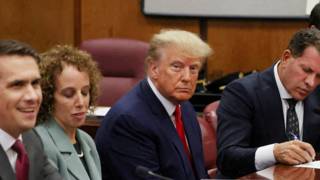
Related
Donald Trump is making history today in New York as the first former U.S. president to stand trial for criminal charges. Trump faces 34 criminal charges of falsifying business records as part of a scheme to hide hush money payments he made to adult film actor Stormy Daniels and others, just weeks before winning the 2016 election. He is accused of violating federal campaign finance laws for failing to disclose the payments and instead recording them as a “legal expense.” Each of the 34 counts carries a maximum sentence of four years in prison. “What Donald Trump is accused of is the type of crime that’s prosecuted in New York every single day … [a] garden-variety, ordinary grift,” says Ron Kuby, a longtime New York criminal defense and civil rights lawyer who is following the trial closely. Kuby explains what we can expect from the trial — the first of four different criminal cases Trump is currently embroiled in, but likely the only one he will stand for ahead of the 2024 election — in the coming days.
Transcript
AMY GOODMAN: This is Democracy Now! I’m Amy Goodman.
Republican presidential front-runner Donald Trump is making history today in a New York courtroom as the first former president to stand trial for criminal charges. Jury selection begins today as Trump faces 34 criminal charges of falsifying business records as part of a scheme to hide hush money payments to adult film star Stormy Daniels in an attempt to influence the 2016 election. The payments were not illegal themselves, but Trump is accused of violating federal campaign finance laws because he failed to disclose the payments and recorded them as a “legal expense,” giving the money to his lawyer. Each of the 34 counts carries a maximum sentence of four years in prison. Trump is required to be in the courtroom while prosecutors lay out their case, unlike the civil trials, where he chose to be there. He didn’t have to be there.
Trump is also facing criminal charges in three other cases: two federal cases involving the retention of classified materials and his efforts to overturn the 2020 election that culminated in the January 6th insurrection, and RICO charges in Georgia based on his push to reverse Georgia’s 2020 election results. Manhattan DA Alvin Bragg may be the only prosecutor to try Trump on criminal charges before Election Day. On Truth Social, Trump’s social media platform, he called the trial, quote — this is Trump — “election interference.” Trump spoke Saturday at a campaign rally in the battleground state of Pennsylvania.
DONALD TRUMP: They’re all Biden trials. You know that, right? And I’m proud to do it for you. Have a good time watching. Have a good time watching. On Monday in New York City, I will be forced to sit, fully gagged. I’m not allowed to talk. Can you believe it? They want to take away my constitutional right to talk. I have a crooked judge.
AMY GOODMAN: For more, we’re joined by Ron Kuby, longtime criminal defense, civil rights lawyer based here in New York, has closely followed the Trump cases.
Welcome to Democracy Now! It’s great to have you with us.
RON KUBY: Thank you so much.
AMY GOODMAN: So, he talks about being persecuted and singled out. You’re a longtime defense attorney. Others are saying, no, he is getting a kind of special treatment that defendants almost never get.
RON KUBY: Well, I don’t think either of those are completely true. One part of the special treatment is his case has moved very, very quickly. It’s been about a year from indictment to the beginning of trial today, whereas we have thousands of young people, mostly young people of color, on Rikers Island sitting there, who don’t have the luxury of bail, whose cases are far older. So, certainly, this case is moving on an expedited basis.
But what Donald Trump is accused of is the type of crime that’s prosecuted in New York every single day by the Manhattan DA’s Office. It has nothing to do with being president or a candidate or a campaign or presidential powers. It’s just a sort of garden-variety, ordinary grift, falsifying business records for the purpose of committing another crime. And almost everybody who falsifies their business records does so to conceal the commission of another crime. You don’t just wake up in the morning and decide to falsify business records because you have nothing better to do.
AMY GOODMAN: Well, you’re a defense attorney, and you know choosing the right jurors is extremely important. And I wanted to ask you about the juror questions, because we know a lot of those questions right now. They’re going to be asked about what podcasts and talk radio programs they listen to, where they get their news. And this is question 30: “Have you ever considered yourself a supporter of or belonged to any of the following: the QAnon movement, Proud Boys, Oathkeepers, Three Percenters, Boogaloo Boys, and Antifa? Talk about the significance of this.
RON KUBY: Well, both sides want to weed out people who they think, by virtue of organizational membership, are really incapable of being fair and impartial, one way or the other, either the prosecution or the defense. Obviously, if you’re a member of the Oath Keepers, no matter what you say about your ability to be fair and impartial, it could reasonably be called into question. And as far as I know, antifa is not a membership organization. Last time I checked, they didn’t issue cards. But if you self-identify as being a member of antifa, chances are you can’t be fair to Donald Trump.
AMY GOODMAN: This is question 31: “Do you have any strong opinions or firmly held beliefs about whether a former president may be criminally charged in state court?”
RON KUBY: And that question is designed to weed out primarily the people who take the position that Donald Trump, by virtue of being the president of United States at one point or another, is not just absolutely immune from everything that he did as president, but he’s absolutely immune from everything he did in his life, period. And if you’re that far off the page, then you probably should not be sitting on this jury.
AMY GOODMAN: Then 32: “Do you have any feelings about how Mr. Trump is being treated in this case?”
RON KUBY: It’s another one of those questions where if people say, “I think he’s being treated unfairly. I think he’s being persecuted. I think, you know, he’s martyring himself of the rest of us,” you’re not going to be allowed. That’s a challenge for cause in almost every situation. On the other hand, if you say, “I think he’s basically being treated fairly. He’s being treated like everybody else,” that’s the answer that the prosecution is certainly looking for.
AMY GOODMAN: As you know, President Trump has argued that the judge, Juan Merchan, cannot be fair because his daughter works with Democratic Party candidates, and he attacks her online, which led to Merchan expanding the partial gag order. He didn’t say, “You can’t attack me, the judge,” but he did say can’t attack family members.
RON KUBY: Right. And Trump has repeated this, and his lawyers have repeated this, over and over again, by virtue of Judge Merchan’s daughter’s employment, he should be — recuse himself. But Judge Merchan is an extremely meticulous jurist. He sought judicial ethics opinions on this long ago. He was told there is no conflict of interest. His daughter doesn’t live underneath his roof. And moreover, Judge Merchan sat on the Trump Organization case, so he knows the people, he knows the players, he knows the lawyer, and he knows how to run a Trump trial, just not necessarily one with Donald Trump present, but a Trump trial nonetheless.
AMY GOODMAN: Can you talk about now what exactly happens, what rights the lawyers have? They’ve got 10 peremptory challenges per side. What exactly does that mean?
RON KUBY: A peremptory challenge is a challenge you can use for almost any reason that you want to strike a juror. You can’t do it on the basis of a protected class — race, religion, national origin — but you can use it because “I don’t like the fact that this juror wore a suit today to sit on jury service. That shows a little too much respect for this process that we’re denigrating. I want to get rid of that individual.” But there’s only 10 of them, and those are used very, very quickly. On the other hand, you have unlimited challenges for cause. And most of the argument around jury selection is going to be challenges for cause.
But what Judge Merchan has done, they’re calling a thousand jurors to sit in jury service — unprecedented number. So, anybody who, at the outset — after Merchan, Judge Merchan, explains the situation, he’s going to ask for a show of hands. Anybody who says they can’t be fair and impartial for any reason, he’s not going to question them individually. You raise your hand, you’re out of here. So, even if 90 out of a hundred potential jurors say, “I can’t be fair,” that’s fine. Then you have 10. Bring in the next hundred. And you’ll have a jury.
AMY GOODMAN: OK, they’re all, though, from Manhattan. Now, Trump says he can’t get a fair trial here in his home city. Talk about that.
RON KUBY: Number one, he doesn’t want a fair trial. No defendant wants a fair trial. Every defendant wants a jury that’s predisposed to acquit them. That’s just sort of baked into the whole process. He certainly can get a fair trial in the sense that you get rid of all the jurors who have strong feelings one way or the other about his guilt or his innocence.
Remember, this doesn’t — this is not a referendum on Trump as president, which would be, I think, a harder case in Manhattan. It doesn’t matter whether you liked his presidency or, like most Manhattanites, loathed it. These actions, the activity he’s accused of engaging in, they took place before he became president. The crime was committed before he became president of the United States. So it doesn’t involve great questions of presidential power and authority. It’s just regular old, garden-variety fraud, with a porn star or a sex worker added in to add some spice to it, and, of course, attorney Michael Cohen.
AMY GOODMAN: So, let’s talk about what exactly he’s being charged with. I mean, this — if you were giving hush money to someone, that would not be a crime.
RON KUBY: Totally legal. Totally legal.
AMY GOODMAN: So, of course, Trump is going simply to argue he just didn’t want to hurt his family, so he wanted this person to remain quiet about their affair. But this has to do with the election. Explain that.
RON KUBY: One of the crimes, the underlying crimes, that the hush money was designed to conceal was federal election finance law, that Michael Cohen was basically making an expenditure, this was a campaign expenditure, and Trump covered it up because he didn’t want the American people to know that he was paying off a porn star just prior to the election. And the timing of that payment is significant, having taken place just before the election. Michael Cohen is going to testify what it was for. There’s going to be conversations that Trump had with other people that make reference to Stormy Daniels and the election. And I don’t know that Trump is going to be arguing anything, because Trump would have to testify to make that argument.
AMY GOODMAN: And, of course, he says he will.
RON KUBY: Of course, he will —
AMY GOODMAN: But he has said that even in the civil cases.
RON KUBY: He always says he’s going to do this or he has done that. And maybe when the time the trial is over, he will have said he testified even though he didn’t. But it’s unlikely, frankly. From a criminal defense perspective, it’s unlikely that he’s going to get on that witness stand.
AMY GOODMAN: We’re not going to see any of this.
RON KUBY: No. There was a brief period of time, a couple of years in the 1990s, where we had cameras in the New York state courtrooms. Most people thought it was a fantastic success, and it helped legitimize the system. Most famously, the Amadou Diallo trial, for those who remember, was televised live. Everybody could see what happened. The powers that be decided that should not be renewed, except for pretrial performances, as it were. So we’re not going to see the trial.
AMY GOODMAN: Can someone convicted of a felony become president?
RON KUBY: Absolutely. There’s no bar to becoming president of the United States if you’re convicted of a felony. However, you cannot own a firearm. So, at least if he gets elected, he won’t be able to have a gun. He’ll have the United States military, but not a gun.
AMY GOODMAN: And you have to be born in the United States.
RON KUBY: Yes.
AMY GOODMAN: I want to thank you very much for being with us. Ron Kuby, longtime criminal defense and civil rights lawyer here in New York.
That does it for today’s show. Democracy Now! is currently accepting applications for our digital fellowship. You can learn more and apply at democracynow.org.
Democracy Now! is produced with Renée Feltz, Mike Burke, Deena Guzder, Sharif Abdel Kouddous, Messiah Rhodes, Nermeen Shaikh, María Taracena, Tami Woronoff, Charina Nadura, Sam Alcoff, Tey-Marie Astudillo, Robby Karran, Hany Massoud, Hana Elias. Our executive director is Julie Crosby. Special thanks to Becca Staley, Jon Randolph, Paul Powell, Mike Di Filippo, Miguel Nogueira, Hugh Gran, Denis Moynihan, David Prude, Dennis McCormick, Matt Ealy. I’m Amy Goodman. Thanks so much for joining us.












Media Options